by Jenny Rose | Mar 25, 2023 | A Flourishing Woman, The Journey
We moved into this house a little less than a year ago.

New Home, May 2022
The chaos of the transition gradually ebbed away, leaving me beached with all my things and a sometimes fearful, sometimes eager curiosity about what this new chapter of my life would bring. This move, for me, was not random, but intentional. I felt it as an important step in my journey to an unknown destination. At this point in my life I’m not much interested in destination; my fascinated gaze rests on my inner and outer landscapes as the days come and go. I travel in the direction of freedom, space, and simplicity.
These last months I have spent time sitting in various places in my space dreaming, imagining, listening to the whispers of this old house, audibly exploring the surge of the neighborhood outside my windows and walls. I have watched the garden leaf out and bloom, then wither and die. I’ve learned the slant of the sunlight coming through the tall windows. From the chaise where I sit writing this morning I can see a patch of eastern sky through the bare branches of a neighbor’s tree outside the kitchen window; from here I watch the dawn come during my early morning journal time.
We have updated the electrical system. We have updated the plumbing. We have invested in a hybrid hot water heater, shaving our electrical costs. We have bought and installed a sump pump in our wet cellar. I have brought home innumerable paint chip samples, pinned them to walls and woodwork in every room, watching them glow and dim as hours and seasons pass across them.
I have refrained from adding anything to my space, filling it instead with a mist of dreams and imagination. Indeed, I subtract objects as I clean and scrub and mop the scarred, stained, pine floor. I’ve lived with the gouged trim, the slapdash paint, decades of nails, rusting staples, and screws in the plaster walls which, when pulled, leave large, crumbling holes.
When I first saw the house, in pictures on a real estate site online, my bedroom was being used as a dining room. It remained a dining room the first time we were here, New Year’s Eve 2021. Our attention was drawn to the exposed original tin ceiling in the living room next to it; we were told the same ceiling was above a newer suspended ceiling in the adjoining kitchen.
In the then-dining room, now my bedroom, another suspended ceiling was installed, the kind with a metal grid supporting ceiling panels seen in office spaces. Some of the panels were painted in lavender curlicues.
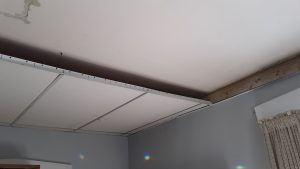
Bedroom ceiling 03/23
It was laughably hideous. I laid in bed and looked up at the ceiling, wondering what was above the curlicues. Another tin ceiling? Plaster? The naked underside of the floor above? One day I would find out.
That day was a couple of weeks ago. One morning my partner and I took the tall steps into my room and pushed up one of the panels, revealing an old plaster ceiling that had been wallpapered and then painted. We could see ancient water staining and cracks.
Once I knew, I couldn’t wait to get the suspended ceiling down. I gathered tools and ragged sheets to throw over my furniture and went to work.
Some of these old houses have plaster made with asbestos. Wallpaper and glue contained arsenic to discourage rats. Older paint often contained lead. As I worked, I uncovered at least two layers of wallpaper and three of paint. I opened a window for ventilation and, wincing, pulled nails and screws out of the plaster, which created the most damage. I used a putty knife to peel up the curling loose edges of wallpaper and flaked paint, leaving what is firmly adhered in place. I worked for a couple of hours, absolutely happy. It took another hour to clean up the mess and get the debris into the dumpster.
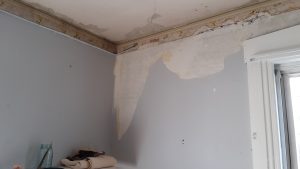
Bedroom 03/23
I’ve taken out two thirds of the suspended ceiling now. The room remembers its former elegant lines. In some places the plaster walls are stripped naked. As I lie in bed, I wonder what this room has contained. How have others who lived here used this space? Who chose the first layer of wallpaper, and the second? Whose hands glued, papered, painted? Who put in this screw and that nail, and why?
Some might find the room austere, bleak. I don’t have much in it right now, because it’s just more to cover, move, and clean as I go. I have a single bed, small but as luxurious as I can make it. The high ceiling soars above the ragged walls like a cloudy autumn sky soars above tattered trees.
All my life something in me has rejoiced in bareness, in spareness. The space between and around objects means more to me than objects themselves. Color, light, air, and music, ever-changing, pure, without form, sustain me more than things.
In this bedroom, in this house, I’m conscious for the first time in my life of a longing for expansion, not to contain more things, but to contain more life, more being. I’m awed by my own freedom, my release from so many burdens I carried in earlier years.
Peeling away flaking wallpaper, brushing away crumbling plaster, I feel like a sculptor. Gentle-handed, I pry and pull. I’ll fill holes, patch, spread joint compound. It will take time. It will make messes. Plaster dust will float out my open windows. One day walls and ceiling will be ready for new coverings of color and texture. I’ll throw sheets over piled furniture, work, clean, move it all back, one wall at a time. I’ll replace the two tall, elegant windows. I’ll glue up faux tin ceiling tiles, honoring the house’s colonial period and aesthetic. The days and hours will pass. Light will move across the walls and ceiling. I’ll open the curtains in the morning and close them at night. I’ll eat and sleep, work and write, swim and walk while the seasons turn around me.
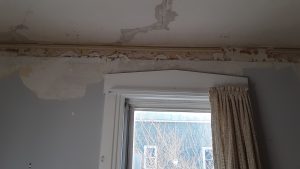
Bedroom 03/23
As I stroke the house, uncovering, reducing, baring, and finally reclothing its lines, my own skin loosens, cell by cell. My eyebrows and lashes diminish. My skin thins and dries, stained by sunshine, silver-rippled by the full moon of long-ago pregnancy. My flesh softens.
Neither the house nor I will again be firm-fleshed, new, perfect. Repaired plaster has a variable, subtle landscape. I have lived in my body for nearly 60 years. Life shapes us and makes us its own. Many lives have had their being within these walls, but I am comfortable with their ghosts.
I think of my own ghosts, too, as I work. Life and time have molded the house and me. The ghosts we call memories stay within us, haunting or blessing, as the case may be. As I chip away at painted-over screws and staples, remove panels and pull away pieces of metal grid, I release the house from the past as I release my own excrescences, recognize and mitigate my own toxic layers of what others expected and how they defined me.
I did not know how captive I was until I found myself free.
Questions:
- What has held you captive in your life?
- Do you find more joy in stripping down (subtracting) or layering on (adding)?
- Are you more likely to repair flaws or cover them cosmetically?
- Are you distressed by “imperfections” in your environment and/or your body and cover or hide them, or do you honor them?
Leave a comment below!
To read my fiction, serially published free every week, go here: 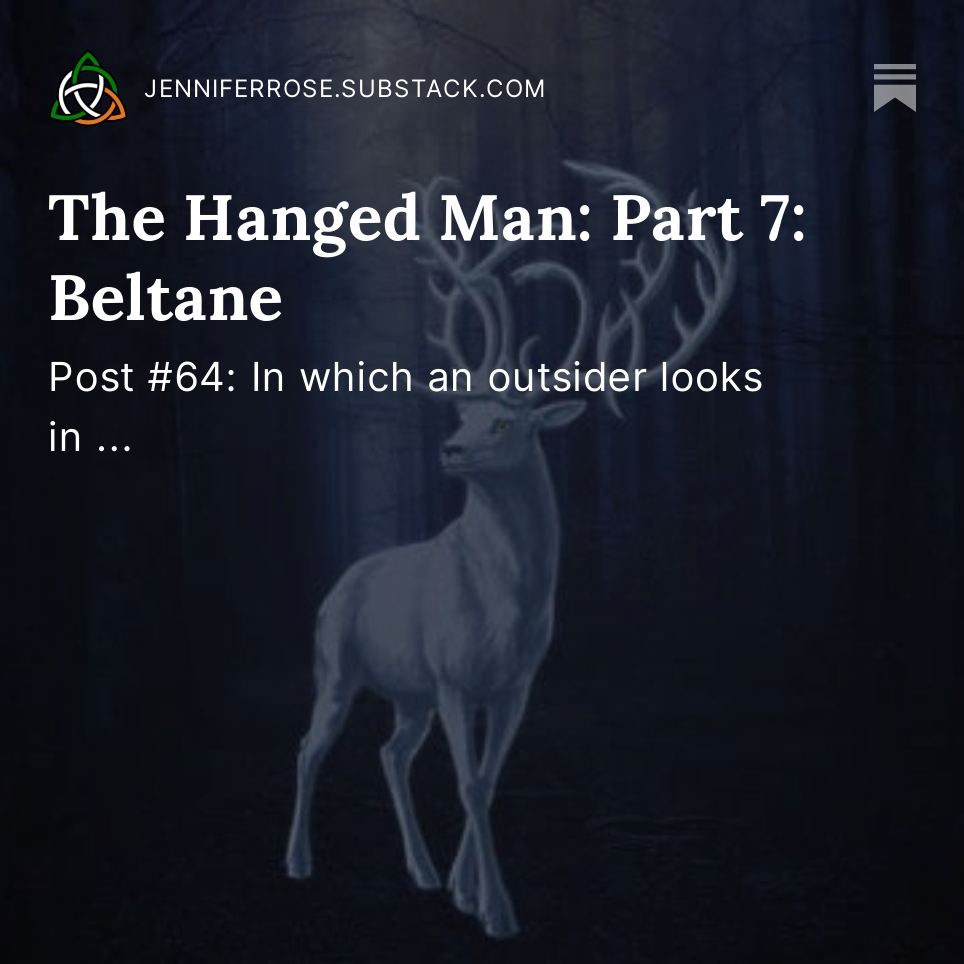
by Jenny Rose | Jan 14, 2023 | A Flourishing Woman, The Journey
When I am struggling, I frequently find myself gifted with exactly the idea I need to help me step back, take a breath, and reframe. It always feels like a miraculous bit of synchronicity. When it happens I remember to have faith in myself, faith in the vagaries of life. I remember I can make choices, whatever the situation.

Photo by NASA on Unsplash
It happened this morning, unexpectedly, in a post I read by an astrologist I follow. This astrologist is unlike any I’ve ever read before. To begin with he’s intelligent, but not in a grifter, let-me-manipulate-you sort of way. His interpretation of astrology is interesting and provocative. I don’t read him to find out what color to wear today, but because his lens is so fascinating.
This morning began at 4:00 a.m. Which is better than yesterday morning, which began at 3:00 a.m. with me hunched over in bed scribbling yet another list. Really important stuff that had to be recorded at three in the morning. For example:
- E birthday card for friend (We share the same birthday this week; clearly this was an urgent reminder.)
- request time off (formally, I mean. My absence is already covered by a teammate. But I might forget I have to travel to Colorado to put my mom in a memory care unit next week, and if I don’t properly request time off in our software system the sky will fall, I’ll be fired, I’ll give my director and friend (see above) extra work and she’ll hate me, I won’t get paid …)
- tape measure (We are visiting the facility we hope to check Mom into before going to her house. How will we know what furnishings to bring for her? How will we know how much wall space there is? Clearly, I need to pack a tape measure, carry it on the bus, on the hotel shuttle, on the plane, in the rental car. There are no tape measures in Colorado.)
- soap dish (We have an informal lost and found at the rehab pool facility where I work. Mostly what gets found are toiletries in the locker room and showers; these are rarely claimed. I need a soap dish, and one is sitting in our lost and found waiting to be retrieved. If no one comes to get it, I want that soap dish. A very important detail that must not be forgotten, as plastic soap dishes are rare and valuable. Soap dish or sleep? … obviously, soap dish is more important.)
- waterproof mattress cover (Mom’s new room will not accommodate a queen bed, which is the only size she has. We have a twin bed for her, but she’ll need new sheets and bedding. I mustn’t forget to get a couple of waterproof mattress covers …)
- Etc.
But where was I?
Oh, right, the astrologer’s post about Mars and planets and friction.
Friction. Pressure. Oh, boy.
I confess I didn’t read the whole article with much attention, mostly because I don’t have much focused attention right now for anything, but this caught my eye:
Mars Positive: Courage and willpower applied consciously towards a specific goal.
Mars Negative: Impatience and misapplied force.
Misapplied force, anyone? I had to laugh.
At that point it was time to get up and make breakfast, so I put the laptop aside. While I cooked, washed my face, cleaned out the cat boxes, and watched the cold dawn light I thought about friction. Pressure. Birth. Transformation. I thought about polished rocks and pearls. I thought about diamonds and fossils and geologic forces and time. I thought about youth and plasticity and vitality, followed by old age, desiccation, brittle bones, weariness, atrophy.
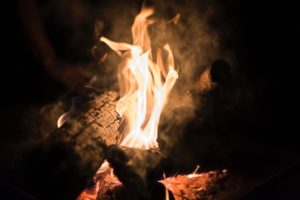
Photo by Josh Howard on Unsplash
Friction can produce fire — cleansing, regenerative, alchemical fire.
I remembered life is full of friction and grit. Experience can smooth our edges, soften our rigidities and certainties, blur our idealism and mellow our arrogance.
I remembered, in short, I can choose to avoid and resist friction (and mostly I do), but sometimes the only way out is through.
This is one of those times. A camel-through-the-eye-of-the-needle time. A time when the right thing to do is the thing I most want to avoid doing. A time when I want to argue with reality. A time when I have chosen and am now resigned to everything that choice entails.
In exactly a week from the minutes I sit writing this draft I’ll be on a plane heading to Colorado to do an unthinkable thing: meet my brother and one of my sons and transition my mother to a locked memory care unit in a place she’s never been before with people she doesn’t know (not that it matters, as she no longer remembers the places or the people she has known) before getting on another plane to come back to my life in Maine.
Even as I write it, it doesn’t seem real.
I wish it wasn’t real.
For the first time this morning, though, while the new day dawned and the cats and I ate our respective breakfasts, I thought about the other side of this narrow tunnel, this birth canal. There will be another side. There always is. What is happening to me, and to the rest of my family? What is happening, locked away, invisible, irretrievable, in Mom’s experience? I’ve done hospice work, and I’ve witnessed how mysterious and beautiful the end of life can be. This event ripples out into the rest of my family system, sanding, smoothing, transforming. Friction is change. Pressure reshapes us. Can I relax, just a little? Can I let it happen the way it needs to? Can I be satisfied I’ve made the choices and decisions I’ve needed to and let my feelings wash me where they will? Can I surrender to the cars, the buses, the hotel shuttles, the planes, the journey, in fact?
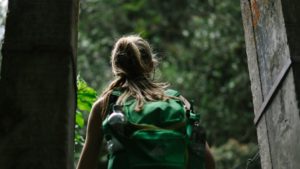
Photo by Dan Gold on Unsplash
Could I set aside soap dishes and birthday cards, payroll issues, tape measures, waterproof mattress covers; the potential for delays, bad weather, mechanical breakdowns, crowds, jammed traffic, overstimulation, viruses, and the general unpredictability of life and people and trust there will be sleep, there will be food, there will be a bathroom, there will be a minute to sit down, there will be help, there will be tears, and I will figure out how to print my boarding pass at a kiosk in the airport?
Well, I could try, at least. I’m willing to try.
There is friction, and friction is magical.
I’m publishing two weekends in a row right after I said I was moving to biweekly posting. But then the trip to Colorado was upon me, which is the weekend I’m scheduled to publish. So I’ll write again on the other side of all this friction. Maybe by then I’ll be a pearl. Or write pearls of wisdom?
Questons:
- What’s the biggest source of friction in your life? What is it shaping you into?
- What wakes you up at 3:00 in the morning?
- Do you avoid friction or welcome it?
- What helps you lubricate life’s friction?
Leave a comment below!
To read my fiction, serially published free every week, go here:
by Jenny Rose | Dec 17, 2022 | A Flourishing Woman, The Journey
I’m pausing. It wasn’t, I hasten to say, my idea! However, after an interesting and stressful concatenation of events I’ve decided to embrace the opportunity to pause.
It all started with a wonderful post from one of my favorite Substackers, Lani Diane Rich. It’s titled “Emotional Ex-Lax.” Honestly, how could anyone not go look at that post?

Photo by freddie marriage on Unsplash
The post suggests an exercise in blind journaling. I journal daily, first thing in the morning, with my first cup of tea. I don’t go on line first. I don’t work in the house, or start breakfast, or make my bed, or clean the cat boxes. I feed the cats (because if I don’t I won’t be allowed to sit peacefully and journal). I pee. I turn on one low light. I heat water and make tea. Sometimes I put on very low music. Sometimes I light a candle or two. At 5:00 in the morning there’s nothing going on. Darkness presses against the windows. Nobody needs anything from me. I’m free, and something of sleep’s twilight lingers. I sit with my laptop, open a new document, and start typing. Every month I delete the last month’s journal entries. I never look back at them. They’re for no one else’s eyes. It’s an entirely private space.
If, for some reason, I miss this time with myself, I notice it immediately. I’m not as centered. I feel more anxious. I feel more stressed. If I can’t get to a word processor, I journal with pen and paper, and then destroy it.
I never thought of blind journaling, though.
I recognized resistance. As I peeled the resistance away, I discovered the roots of it: perfectionism. That made me mad. I’ve worked so hard to uproot that toxic growth, but I never seem to get it all eradicated. It’s like bindweed, that bane of gardeners. Out in Colorado, where I used to live and garden, bindweed choked the dry landscape. Its roots can grow 6 feet deep. Any attempt to dig it up or kill it above ground merely encourages it. It grows fast. Herbicides don’t work. Its folk name is ‘Devil’s guts.’ A perfect description.
I think about perfectionism as bindweed.
Even as I journal, I edit. I correct spelling. I make sentences and paragraphs. Sometimes I even cut and paste. For a journal no one else will ever see and I won’t read again. For a journal document I’m going to delete in four weeks. If I blind journal I can’t edit as I write.
It won’t, God help me, be perfect. It won’t even kind of be perfect. I’m a good typist, but I make mistakes. Sometimes the cursor jumps around. Sometimes my sentence structure is poor.
Unacceptable.
So, naturally I made up my mind to try blind journaling, to challenge my perfectionism if for no other reason.
I chose a day off and journaled the usual way for a bit, then set a timer for 20 minutes, shut my eyes and blind journaled. I thought I was already emptied out, but wow. I was in full flood when the timer went off, and it felt like I’d only been doing it for five minutes. I loved it. I knew I was making mistakes (which I refused, by the way, to go back and fix!), but they didn’t interrupt my process. I just kept going, never looking back, never losing the thread of what I was saying. No visual distraction whatsoever.
I didn’t want to stop.
Well!, I thought. This will be a fun thing to blog about.
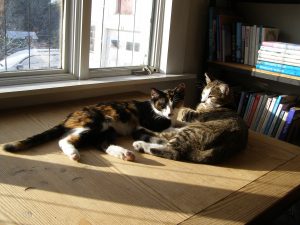
Izzy & Ozzy; Fall, 2020
I picked up my 16-ounce cup of tea, pomegranate green this season. Our little calico cat, Izzy, who had been snuggled in her favorite position in my armpit, woke up and decided she wanted to be in my lap where the laptop was. I pushed her away. She came back. I pushed her away. She started chewing on the upper corner of the screen, an obnoxious habit she has. I pushed her away with more irritation this time. The tea I was holding slopped onto the keyboard. I cursed, wiped it away, tipped the computer and let it drip out. I got a couple of Q-tips and dried around the three or four keys that got splashed. I sat down again to go back to my peaceful morning journaling.
The computer died.
Shit!
I plugged it in in case the battery was run down, but I knew it wasn’t. I let it be for an hour, then tried to turn it on.
Nothing.
When the computer store opened, I got in the car and took it over. Mark, my computer guy, shook his head. I left it in his capable hands.
Now my quiet day off, in which I didn’t have to go anywhere or do anything but noodle around at home, had turned upside down. My serenity fled. My excitement about starting a rough draft of a post on blind journaling withered. I couldn’t pay bills and deal with money, always a major stressor. Speaking of money, replacing my laptop would cost over $1,000. And what would repairs cost? And how much money do I have in savings? In checking? I couldn’t check! Panic until I remembered my cell phone is connected to the Internet. I couldn’t write, at least not with a word processor.
But none of that was the worst thing. The worst thing, and I’m completely mortified by this fact and would prefer to hide it from both myself and the world, was I couldn’t play solitaire!
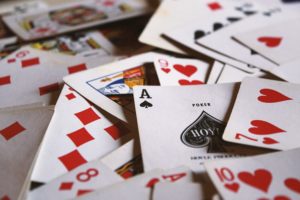
Photo by Jack Hamilton on Unsplash
This realization was so unwelcome I longed, craved, itched to play a few games of solitaire and “think about it.” Except that’s a lie. I wanted to play solitaire so I could numb out.
I roamed around the house, restless, wanting to crawl out of my own skin. The day I had looked forward to suddenly seemed dull and endless. I didn’t want to read. I didn’t know what to do with my anxiety. I started waiting for the phone to ring with news of my machine.
I did eventually get a grip but I recognized the symptoms of withdrawal from an addiction, and I didn’t like it. I kept myself busy with several tasks I’d been putting off. I cut greens I’d gathered with a friend a few days before and decorated for Yule. I pulled out a notebook and continued journaling, off and on, long hand. It gave me a sore hand, but it helped. I told myself I could rough out a blog post long hand, too. But it was probably not worth it. I’d have my laptop back by the end of the day. Probably. Maybe. Wouldn’t I?
I set aside the budget and a couple of bills I’d just received and weren’t due for a week or more. I tried not to think about money, or scarcity, or money.
Not thinking about money – la, la, la-la – fingers in my ears and eyes squinched shut.
I tried not to think about my email piling up. I read some of it on my phone, but the screen was so small it wasn’t much fun.
I thought and journaled about how busy I always feel, how often I hear myself say I’m tired, how overwhelmed I feel. I’ve been telling myself feeling overwhelmed is natural. I work; I run a blog and a Substack page, publishing on both every weekend; I’m writing another book; and now I’m co-manager of a long-distance situation in which a loved one is recovering from a broken hip and sinking into dementia. I anticipate making the long trip from Maine to Colorado and back again at some point during the holiday season, running the gauntlet of weather, travel complications, crowds, and various respiratory viruses. Oh, and spending money I don’t have. Especially if I have to replace my laptop.
Of course I’m overwhelmed.
Yes, said a snarky little voice in my head, “and how much time and energy does it cost you to play solitaire in all the pauses, cracks, and crevices of your life? What about visual stimulation? What about your problem with speeding? What about your anxiety? You’re not helping your anxiety, you’re feeding it!
The day passed and the computer guy didn’t call. The next day was a work day. Normally I would have been working on posts for the weekend ahead. I was beginning to feel behind. If I didn’t get the laptop back I wasn’t going to be able to post. Less than perfect. Inconsistent. Letting my readers down. Everyone would probably unsubscribe. Even if I got the laptop back, the weekend was going to be tight. Starting from scratch on Saturday morning for Harvesting Stones and on Sunday morning for Substack takes a lot of hours out of my weekend, when I also run errands, clean, do laundry, cook for the week ahead, and take care of business I haven’t had a chance to do during the week.
And I was already tired. Already wanting those two days off, not to fill up, but to relax in. Could the solitaire really be feeding my anxiety rather than calming it, I wondered?
Yes.
But –
Yes, your solitaire habit is feeding your anxiety. You know it.
Shit!
At the end of the day, I called my computer guy. He informed me my machine was disassembled and he’d been running a fan on it night and day. He didn’t know if it was a goner or not; he wasn’t going to put it back together and plug it in until he was sure every molecule of water was gone. He told me, rather pointedly, he’d call me.
OK, I thought. I won’t post this weekend. Nobody will care but me. I’m allowed to take a weekend off. I read all kinds of people who take frequent breaks and pauses. I don’t think any the less of them for it; in fact, I admire their self-care and confidence.

Photo by Alex Iby on Unsplash
Friday happens to be my nine-hour day at work, so I wouldn’t have used the laptop much that day in any case. I gritted my teeth, used a computer at work to catch up a little, and tried not to worry too much. I never play solitaire at work, so it was my third day without it.
Meanwhile, I made and received long distance calls from the facility where my loved one is recovering physically and wandering mentally. I finished the book I was reading and started another. I journaled a lot in my notebook. I played with the cats, giving them my full attention, which felt nice. I noticed what I was eating and enjoyed the taste of my meals, unusual for me. I savored my tea more. I wrapped a few Yule gifts and got them in the mail. I did some cleaning. I exercised. I put on an old movie and did upper and lower body resistance training in front of it rather than playing solitaire.
I slept well. I felt less exhausted. The inside of my head was quieter. I even took a nap, a thing I don’t normally do, as playing solitaire is “resting.” (Uh-huh. Whatever you say.) My anxiety ratcheted way down. I had a couple of crying jags, but they passed and I felt relieved rather than more upset when they were over.
I had more time.
I have more time because I’m not writing without my laptop, I thought.
“No. You have more time because you’re not playing solitaire in all the cracks and crevices,” said the snarky voice.
On Friday, while I was at work, my laptop was resurrected and my partner brought it home. What saved its life, I am told, was there was no sugar in the tea. Who knew?
By Friday evening, when I returned home from work, I’d made some decisions:
- No more solitaire.
- No more liquid in close proximity to the laptop.
- Take the weekend off. Really take it off. No pressure to post and publish. No solitaire. Embrace the pause. Make it last. Feel about things. Think about things. Be present.
All weekend I had the half delighted, half guilty feeling I was playing hooky. I ran several errands. I journaled on the word processor. I dealt with receipts, bills, accounts, the budget. I did some cleaning and laundry. I read. I listened to music. I watched a couple of movies and exercised. I played with the cats. I texted with a friend. I talked to my loved one and their nurse in Colorado. I made a new recipe for a pork shoulder in the crock pot which made the house smell like citrus, garlic, and herbs. I read several inspiring pieces from the Substackers and minimalists I follow. I started making notes for this post, which flowed into writing a rough draft.
It was a good weekend. It didn’t feel too short or too rushed. I didn’t feel pressure or anxiety. I slept well.
I’ve realized it’s time to make some changes. It’s a good time of year to reevaluate and do that, right? I didn’t set out to do it, but once it was forced upon me I realized I’ve been running a little faster every day for a long time, feeling a little more tense and anxious, and needing a little more numbing to manage it all. I’m grateful I was forced to stop. I’m going to start moving again, but in a different way, with slightly new priorities and without the damn solitaire!
(“You’ve finished the post!” says the snarky voice. “You’re way ahead this week. Wouldn’t you like to relax, play a game of solitaire, and celebrate?”
Oh, shut up!)
Questions:
What’s your favorite numbing activity?
On a scale of 1 (hardly any) to 10 (all), how much of your power does it have? Are you uncomfortable about the level of power your habit has over you?
Does your habit increase your anxiety?
Does your habit decrease your focus?
Have you ever formally kept track of the time you spend doing your favorite numbing activity?
Leave a comment below!
To read my fiction, serially published free every week, go here: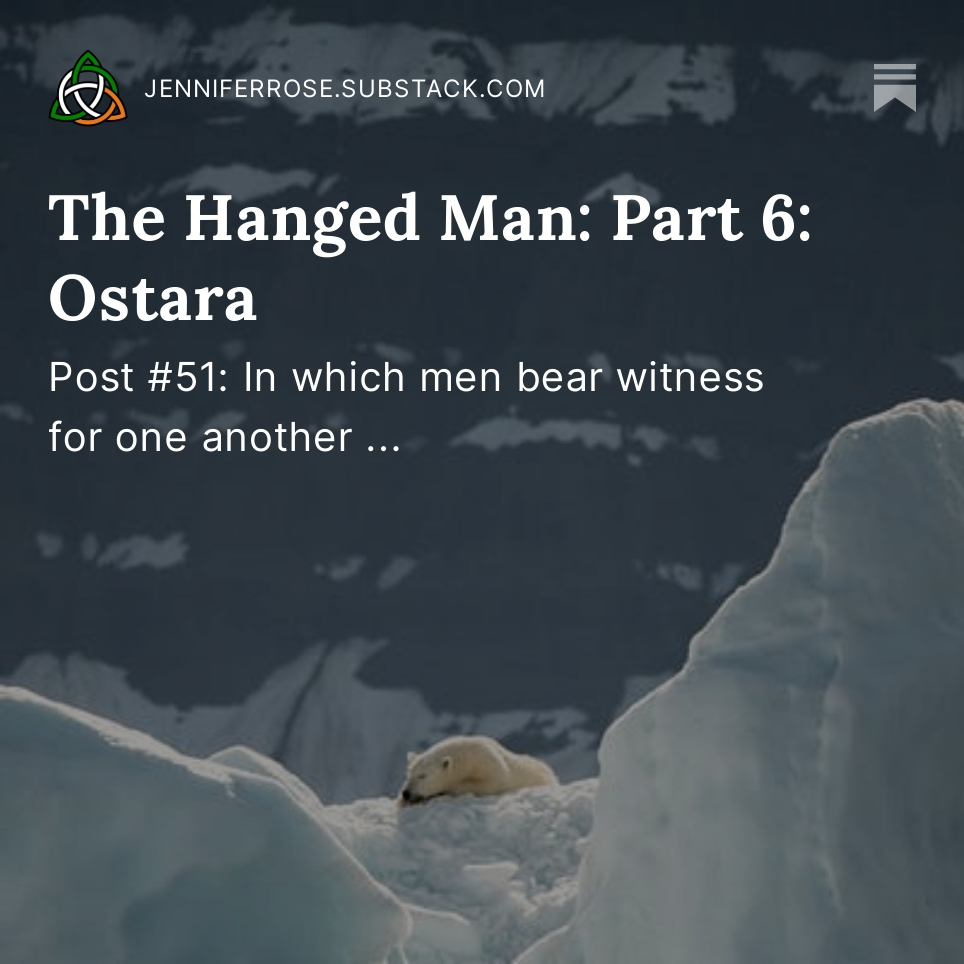
by Jenny Rose | Nov 19, 2022 | A Flourishing Woman, The Journey
I was taught, as a child, it was my job to alleviate distress. One must always respond immediately and help the sufferer. It went far beyond duty and obligation. If I did not fix the distress of others, my childish world would fall apart. Everyone would leave.

Photo by Cristian Newman on Unsplash
For a child, such consequences are death.
I was also taught “help” meant doing anything and everything I was asked to do, immediately, unquestioningly, and unendingly. My own distress was of no consequence at best and a direct threat, an unwelcome competition, at worst.
That core teaching stayed with me as I grew up, and has been a keynote of my behavior and experience most of my life. I wanted to help people. When people around me suffered, I felt an overwhelming, painful panic, as well as complete responsibility. I had to do everything I could, give the situation my all in order to “help.”
I also grew up with an inability to respond to my own distress. Hunger, thirst, fatigue, emotional and physical pain, were all ignored. My disconnection from my own needs and experience led me into chronic pain, eating disorder, depression, and anxiety. I was unaware of my traumatic wounds. I had no interest in helping myself. Helping myself was selfish, bad, and unloving.
Then I studied emotional intelligence and all the work and therapy I’d done over the years with guides and teachers as well as on my own (see my Resources page) wove together into an intention to reclaim my health and my self.
This blog has been a key part of that work.
I still don’t like to watch people suffer, but I’m more careful now about “helping.” I’ve learned suffering is not necessarily the enemy. We get ill, have painful emotional and physical injuries, have uncomfortable feelings. We age and our bodies and sometimes our minds wear out. To be human is to experience these things; they’re inescapable. We can’t control what happens to us, but we can control how we deal with such events. When someone is suffering, I’ve learned to be less reactive, to remember it’s not my fault or my responsibility to fix it. I’ve learned to notice whether the sufferer is helping themselves before I jump in.

Photo by Joshua Earle on Unsplash
I have learned a bitter lesson: No one can help someone who will not help themselves.
I realize now we can’t always go back to where we were before we were wounded; we can’t always heal the wound itself. Sometimes our wounds and suffering are taking us into something new and what’s called for is not healing, but tolerance and patience.
What does “help” mean? This is an important question. Does help mean we respond promptly to all demands, whether or not they are safe, sustainable, or even possible? Does help mean we make thoughtful, intentional choices for safety and practicality even if those choices go against what we are being asked to do in terms of “help?” Do we decide what the best “help” is, or does the sufferer get to choose what kind of “help” they want?
I’m still uncomfortable talking about my own pain. Honestly, I’m still uncomfortable even noticing it, but I practice every day at staying present with how things are with me. It feels selfish and wrong, but I know that feeling doesn’t mean it is selfish and wrong, just that it’s very different from my early training. Sometimes the choice that feels worst is the best choice. Sometimes suffering is the only possible road forward into peace, growth and resilience.
None of us has the power to help anyone avoid suffering. I confess I’ve argued with that reality all my life, but it hasn’t done a bit of good. In fact, it’s done harm, most of all to myself.
I have occasionally, in the depths of anguish, asked for help. When I do that, what am I asking for?
Nothing tangible. Not money or a thing. Not love. Not sex. Not a gallon of ice cream. I’m not asking for someone to come along and fix it all, or take responsibility.
I’m asking to be heard. I’m asking for someone to say, “I’m here. You’re not alone. I believe in you. I know your goodness, your strength, your courage.” I’m asking for a safe place to discharge my feelings. This might involve snot, wet Kleenexes, rage, and a raised voice.
A safe place is not a place where someone else takes responsibility and fixes, or asks me to stop feeling my feelings, or is clearly uncomfortable with my suffering. A safe place is provided by someone with healthy boundaries who is willing to witness my distress without feeling compelled to fix it.
Witness. A witness. That’s ultimately what I want. Just someone to be there with me for a little while. I can face my own demons and challenges, but I can’t do it all alone.

Photo by Gemma Chua Tran on Unsplash
None of us can. We are social animals. But we can witness for one another. We can sit quietly, holding a safe space without judgment or a fix or advice, and just witness. Pass the Kleenex.
It’s the hardest thing in the world for me to do. Simply witnessing seems so passive, so weak, so useless. Someone right in front of me is deeply distressed and I simply sit like a bump on a log witnessing? Are you kidding me?
Surely, I can do better than that. I can do more than that. It’s up to me to make their suffering stop!
And yet. And yet. Isn’t finding a witness incredibly hard? How many people in our lives can take on such a role? What an inestimable gift, to be willing to walk beside someone who is suffering, to be willing to stay, to not look away. What if our boundaries were so healthy we could do that? What if we weren’t afraid of suffering? What if we were wise enough, strong enough, to make room for it and sit down beside it?
Someone I love is in great anguish of spirit. They beg me for help, but a very specific kind of help which is ethically and practically impossible for me or anyone else to give. Which makes me an enemy. Which makes my loved one even more alone than they already feel, more victimized, more powerless, more confused.
There is nothing about this that doesn’t suck. I dread the phone calls beyond words because I don’t want to witness this suffering. It feels unbearable. But my loved one must bear it, and if they have to, I can. I choose to witness. It feels like nothing. It’s not what’s wanted. But at this point it’s all I can do. So I will keep calling and answering calls. I will get up in the morning and talk to case managers, nurses, CNAs, palliative care consultants, nursing homes, and whoever else will talk to me. I will update friends and family. Then I will get up the next morning and do it again.
I pray there is some power in witnessing, some rightness. I pray that somehow my love and willingness to remain a witness does a little bit of good, provides some small comfort, lights a candle in the darkness of dementia, even for a moment.
And I search inside my own suffering for wisdom, for healing, for grace, and for faith.
To read my fiction, serially published free every week, go here:
by Jenny Rose | Oct 8, 2022 | A Flourishing Woman, The Journey
Now is the path
of leaving the path.
And we hear our own voice
demanding of ourselves
a faith in no-path,
when there is no faith at all.
–David Whyte, from “Millennium”
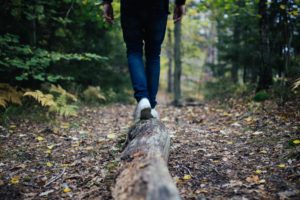
Photo by Jon Flobrant on Unsplash
I sit in my favorite grey-green overstuffed chaise, a pillow at my back, a cat curled in a cat bed behind me on the back of the chair, my laptop on my lap with a slim volume of poetry by David Whyte titled Fire in the Earth next to my leg. A bookmark indicates the above passage. It’s a chilly, grey day. As I sit here the furnace hums and stops, hums and stops, keeping the temperature around 60 degrees. This house we bought in May has a brand-new propane hot water furnace, supposedly the most economical and efficient available. This week is the first time we’ve used it. What will propane cost this winter? Will electrical costs spike as much as predicted? Will it be a cold winter or a mild one?
Always, this question in my mind: “Will I be able to manage economically?”
Enlarging my own personal bubble, I ran errands this morning. A haircut from a friend, during which we talked about the coming winter, how costly it might be, how cold it might be, how effective foam and cloth barriers like rags and old blankets might be in chinks and cracks around doors and windows. How can we hold in the heat, keep out the icy fingers of cold reaching for our paychecks?
I went to the town dump with the recycling, plastic and cans. Does all this material really go for recycling, or is it quietly disposed of in earth or ocean somewhere out of sight? I try to have faith that is really is recycled. Eggs are cheaper when I buy 18 in a carton, but the carton is plastic. But the plastic is recyclable. Maybe. If they actually do it.
This is the kind of thing that preoccupies my mind. A lot.
The furnace clicks on again. How much would I save if I turned it down just 2 degrees?
After the dump, I went to the store. I bought a couple extra jars of salsa, a couple extra pounds of butter. I’ve read about the climate-change decimated tomato crop this year and to expect shortages. Ditto butter. I bought a turkey on sale. It’s early, but I’ve read turkeys will also be in short supply. Every time I go to the store, I’ll buy a tomato product for my pantry, a pound of butter for the freezer.
Enlarging my small city bubble, maybe the projected shortages aren’t real. Maybe it’s all hype, designed to keep people spending as recession fears rise and prices climb. Maybe we can’t believe anything we read or hear from anyone. It’s like standing on the beach in bare feet, feeling the waves pull the sand away from beneath my soles, the sand of common sense, the sand of objective reality, the comforting, warm sand of sanity and critical thinking. Maybe the tide is too powerful, the waves too forceful for most people to withstand. Maybe, by the end, we will really believe in … nothing. Our individuality will be erased. Art, science, and thought will be exterminated. Our lovely sexuality will be neutralized and sterilized. Our magnificent bodies will be surgically altered according to our whims or the dictates of the totalitarians in charge and, if possible, amputated altogether from our increasingly narcissistic and developmentally arrested minds.
From the bubble of my chair in this moment of solitude with my fingers on the keyboard to the world. It’s a grim journey.
I feel increasing pressure to bring in more money. More hours are not possible right now at my job. Another job? Two other jobs? I’ve sold everything I can. I budget every penny. How much of my anxiety is based in real conditions and how much is my longstanding fear of scarcity and tendency to catastrophize? Is it not a job I need, but to GET A GRIP?
I can’t tell. Ask me when heating season is over.
Of course I could get a side job. It’s what a normal person would do. Need more money? Find more work. But is that the right thing for me to do? (I do still claim the right to think for myself.) Would the extra money be worth the time, the energy, the fatigue? I don’t want to live to work and earn. I’ve never wanted that. I’m nearly 59 years old. If I don’t take care of my excellent health, I may not get it back. Is an extra couple of hundred dollars a month worth the strain?

Photo by Angelina Litvin on Unsplash
I’d love to earn my living writing, but I believe it’s a less and less realistic dream. Traditional publishing is dying. Soaring costs and shortages, not the least of which is paper, are forcing change. Very few writers live by their writing alone. Very few. Many do earn some income from it, however.
I love books. I also love trees. If I must choose between a book in my hands and a tree, I’ll read on a digital device for the sake of the tree. Even now I never buy a new book, only used. I write – and people read what I write – on two digital platforms, this WordPress blog and Substack. Should I be monetizing those rather than searching for another job?
I’ve been having that internal conversation for years.
Would I rather avoid asking for donations or putting up a paywall and clean houses or something like that? Anyone can clean. No one but me can write what I write.
I recently picked up a couple of used books of David Whyte’s poetry. The first poem in the first book I opened contained the above excerpt. I was sitting outside in the weakening sun when I read it a couple of days ago. I put the book down and cried.
Oh, Mr. Robert Frost and his road not taken. The well-traveled roads. The less well-traveled roads. The once travelled but now overgrown roads. The paths we tread, following others, and directed by others. The faint game trails that peter out in the wilderness. The well-paved roads and paths that lead to Hell. And now Whyte asks if it’s time to leave the path altogether. Not only that, but to have faith when I have none. Faith in the no-path.
And aren’t we there, at the no-path? Civilizations have collapsed before, but not as the planet was undergoing its own collapse. Well, maybe that’s not right. Maybe in eons past it’s all happened before – relatively abrupt climate change, enormous die-off, cataclysmic geological and oceanic reshaping, and reemergence into a new normal, healthy, planetary system.
If there were paths humans could tread through all that, they’ve been lost.
But let’s make the bubble smaller again. I can’t choose your path, or anyone else’s. Is the right path for me the no-path? The money path is clear. Work more, spend less, have more money. We all know it. Most of us have walked it. It’s well-signed and well-traveled. There’s an equally well-signed and well-traveled path into theft, fraud, extortion, etc., but none of those are options for me, so let’s not complicate matters.
What’s the no-path? Oh, that would be the writing. Always. Whatever our creative work is, it takes us on to a no-path, because creativity is unique. We’re always breaking trail, one way or another. We may follow, for a time, the paths of others, or intersect their trails, but we’ll make our own unique track, worn by our footsteps as we go along, unrolling in front of our feet, existing only because we turned off the main road into a no-path … and made a path.
Faith in a no-path when there is no faith at all. What a strange, dream-like, impressionistic phrase, balancing on the edge of holy foolishness and divine wisdom. It would take a poet of Whyte’s caliber to – well, to take that path.
Right now I’m pausing, considering my options, thinking, feeling, reading and writing my way forward. I don’t have a map for these times. Does anyone? Perhaps faith isn’t necessary, just determination and choosing the next step.
Wherever we go
we can only take a step from here.
–David Whyte, from “Millennium”
It’s good to be reminded of the no-path. The six-lane highway we’ve been following has led to climate change, increasing political and social tensions, and worldwide social and economic instability. Who knows where a no-path might take me; it could hardly be much worse. At least it would be my own path, chosen by me. My feet would define it, my choices shape it. My sweat. My challenges. My journey. No guarantees, but no lies, either. Lonely, perhaps, but I’m no fan of doing what everyone else does, just for the sake of it.

Photo by NASA on Unsplash
Or maybe it’s not a question of travel at all, at least not all the time. Maybe it’s a question of standing still, like a mountain, like a tree. Standing still is an art we’re losing as a species. Maybe there’s nowhere to go and nothing to do; everything is just as it should be, no matter how uncomfortable or fearful. Maybe I have enough.
Maybe I am enough.
And standing still,
saying I, and the small vision I have
-is enough, becomes the hardest path of all.
–David Whyte, from “Millennium”
To read my fiction, serially published free every week, go here:
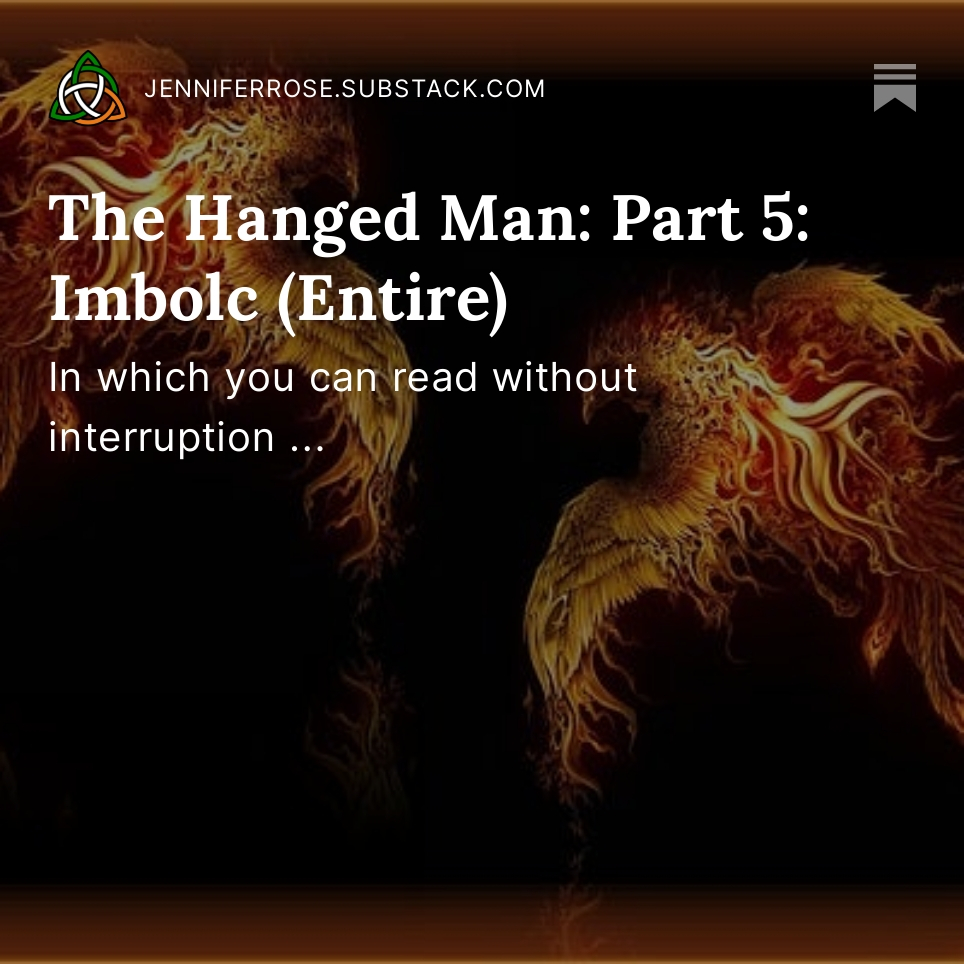
by Jenny Rose | Sep 24, 2022 | A Flourishing Woman, The Journey
As I’ve thought about this post, I realize the theme of being lost and found is a thread running through my life and my writing. Years ago, when I was first introduced to Clarissa Pinkola Estes and devouring everything I could find by her, she used a phrase I’ve never forgotten: everything lost is found again.
Everything lost is found again.
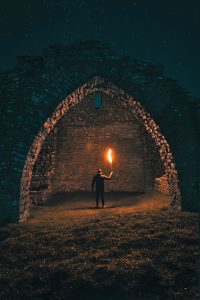
The possibility of that truth gave me deep comfort, something I badly needed in those days.
Maybe we don’t find all the things we lose in our lifetimes, and maybe not in our deathtimes. But maybe someone else finds what we lost. Or maybe what we lost comes back to us looking so different we don’t recognize it. Or maybe what we lost is not truly lost at all. We carelessly leave things behind, or we amputate them, or we deny they were ever there in the first place. We fear we’ve lost them. We try to lose them. But maybe they never really leave us, they just hide somewhere in the attic of our minds until we need them. We ascend the stairs, enter the musk and debris of years, all the broken, aging, outdated and rejected parts of our lives and ourselves mouldering together in cobwebs and dust.
I like to imagine that.
I’ve posted before about being lost and found. I went back and read it as I worked on this post, so as not to be repetitive. That post was a seasonal meditation on the nature of change. I didn’t explore it quite from the angle of losing to find.
I came across a quote recently from Kristin Martz: “We lose ourselves in the things we love. We find ourselves there, too.” It made me smile, and think about the parts of my life so deeply absorbing I am self-forgetful as I live them. My head is empty. I am pure being, without self-consciousness or anxiety. Time does not exist. I feel a kind of boundary ecstasy, an awareness of connection to everyone and everything, an essential and lovely part of some greater whole.
Perhaps during such times we lose all the crust, the armor, the accumulation of useless and punishing junk we’ve somehow picked up or been taught, and are pared down to who we really are in our souls and spirits.
Many of us don’t want to let go of our junk, though. It’s been with us so long it forms part of our identity, part of our story, and we don’t want to let it go. Then who would we be? How would we recognize ourselves? What might change? What different or challenging things might we be required to do? We don’t take the leap into anything we might lose ourselves in, so we never fully find ourselves, either.
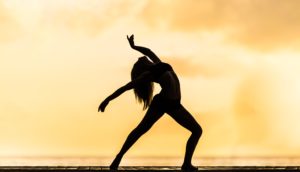
Photo by David Hofmann on Unsplash
Maybe the times in life when we truly feel we’ve lost it all are also the times we’re finding unimaginable grace and meaning.
It’s a circle, a natural life cycle, an ebb and flow of experience.
Another thing I came across somewhere years ago is the idea of an older, wiser version of ourselves, always at our shoulder supporting, advising, guiding, and cheering us on as we journey through our lives. I often make a picture of it in my mind, myself as an old (well, older!) crone, holding my hands out to a younger, struggling self the same way I hold my hands out to children I’m teaching to swim.
“You can do it. I’m right here. I won’t let go of you. You’ve got this! Now … swim!” Or jump. Or put your face in the water.
“Risk,” my elder self says, “dare, follow your heart, do what you need to do for yourself. Go ahead, write, it, dream it, imagine it, enjoy it. Be happy. Play. Rest. This is the way forward.”
And, “I believe in you.” That’s what I most long to hear.
I know it’s terribly cliched, but lately I’ve been thinking about what life means. Does it mean anything? Can anyone say what it means, or must we all make our own meaning? I lean toward the latter. I’ve wondered before what life is for, what I am for, but always in soul-dark times. This is not a dark time for me. In fact, I’m gradually coming back into the light. Now the question is a curiosity, a toy, and my answers are not concrete, not a vehicle for getting through another day, but more intuitive and less formed into language.
I keep going back to that quote: “We lose ourselves in the things we love. We find ourselves there, too.”
Losing everything to find something. There’s some kind of deep truth in that my intellect can’t quite grasp, but my spirit does.

Photo by Cristian Newman on Unsplash
I wonder, with an inward smile, if that’s not my answer for the meaning of life. Finding myself, however that happens. Paring away all the scar tissue and junk, losing and losing and losing the people and places I thought were part of my identity, along with objects, money, youth, innocence, and countless other small, ordinary losses we all experience until the best, most extraordinary me is revealed. Wouldn’t it be ironic if the meaning of life is nothing more than to immerse ourselves in it, cherish our physical experience and pleasures, give ourselves to those activities in which we lose ourselves …
… and find ourselves?
No philosophy. No agonized handwringing or intellectual labyrinths. Just body, soul, joy, and loss. And discovery on the other side of loss.
Maybe the meaning of life is simply to live.
























